Organisational Behaviour Report: Tesco's Culture, Power, and Politics
VerifiedAdded on 2021/02/21
|18
|5340
|17
Report
AI Summary
This report provides a comprehensive analysis of organisational behaviour within Tesco, a major British multinational retailer. It begins by defining organisational behaviour and its importance in monitoring and influencing employee performance. The report then delves into Tesco's organisational culture, examining factors such as masculinity vs. femininity, individualism and collectivism, uncertainty avoidance, and long-term orientation using Hofstede's cultural dimensions model. It also explores Herzberg's two-factor theory of motivation, highlighting both motivating and hygiene factors, and Handy's culture model, including power, role, task, and person cultures. Furthermore, the report examines the different types of organisational power, such as coercive, reward, legitimate, and referent power, and how they influence employee behaviour. The report also discusses organisational politics within Tesco and the application of content and process theories of motivation. Overall, the report provides a detailed overview of how organisational behaviour principles are applied in a real-world business context, focusing on Tesco's specific practices and challenges.
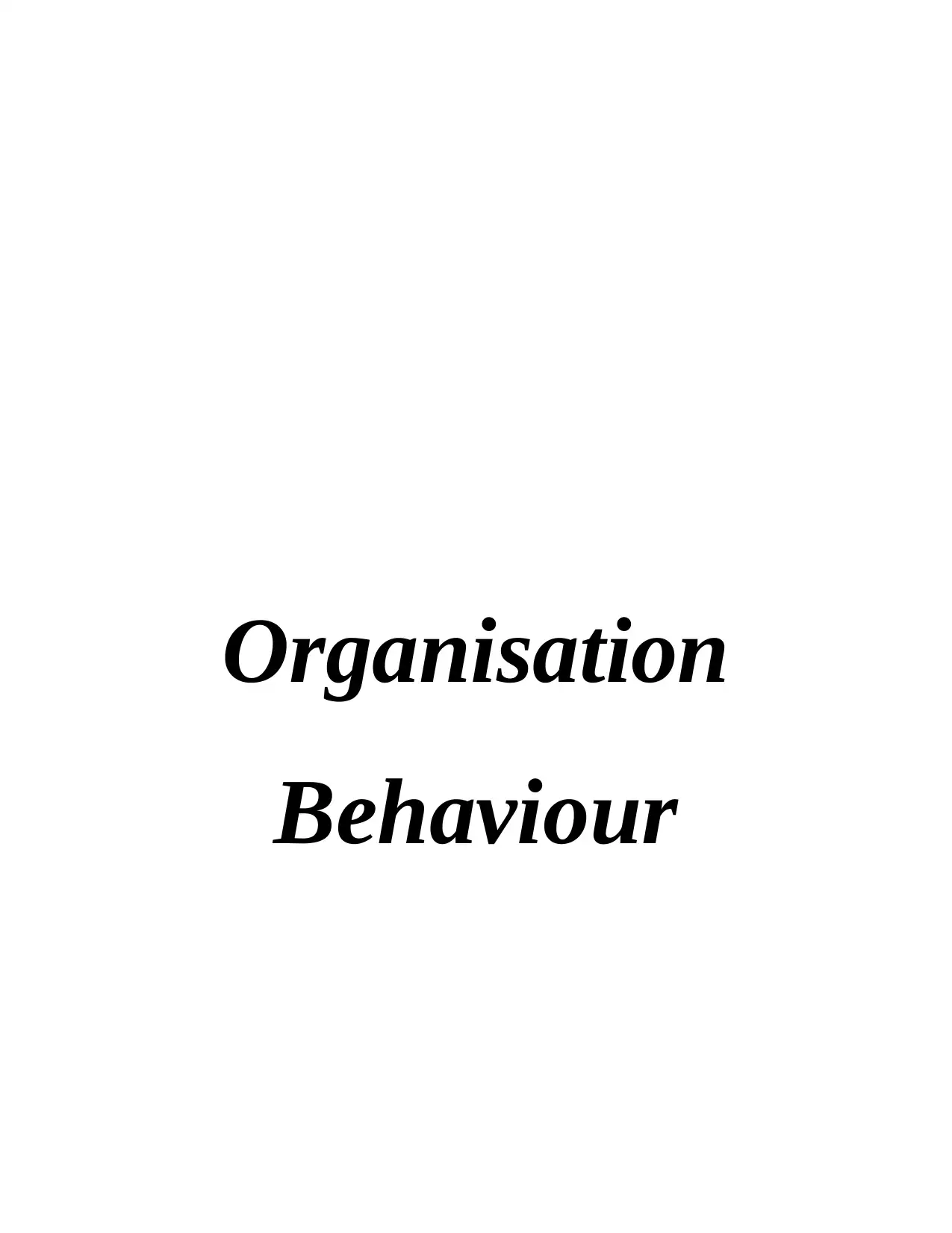
Organisation
Behaviour
Behaviour
Paraphrase This Document
Need a fresh take? Get an instant paraphrase of this document with our AI Paraphraser
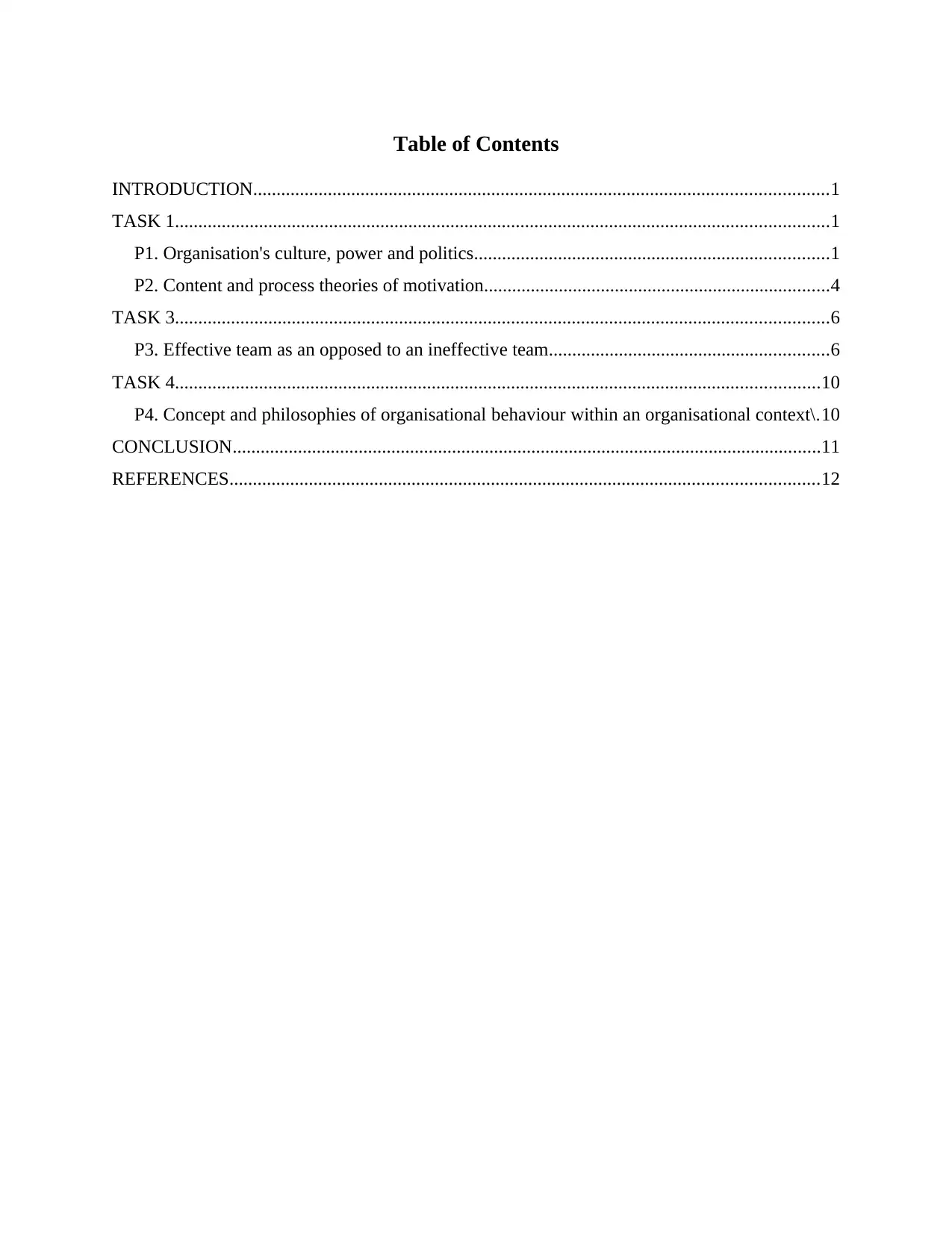
Table of Contents
INTRODUCTION...........................................................................................................................1
TASK 1............................................................................................................................................1
P1. Organisation's culture, power and politics............................................................................1
P2. Content and process theories of motivation..........................................................................4
TASK 3............................................................................................................................................6
P3. Effective team as an opposed to an ineffective team............................................................6
TASK 4..........................................................................................................................................10
P4. Concept and philosophies of organisational behaviour within an organisational context\.10
CONCLUSION..............................................................................................................................11
REFERENCES..............................................................................................................................12
INTRODUCTION...........................................................................................................................1
TASK 1............................................................................................................................................1
P1. Organisation's culture, power and politics............................................................................1
P2. Content and process theories of motivation..........................................................................4
TASK 3............................................................................................................................................6
P3. Effective team as an opposed to an ineffective team............................................................6
TASK 4..........................................................................................................................................10
P4. Concept and philosophies of organisational behaviour within an organisational context\.10
CONCLUSION..............................................................................................................................11
REFERENCES..............................................................................................................................12
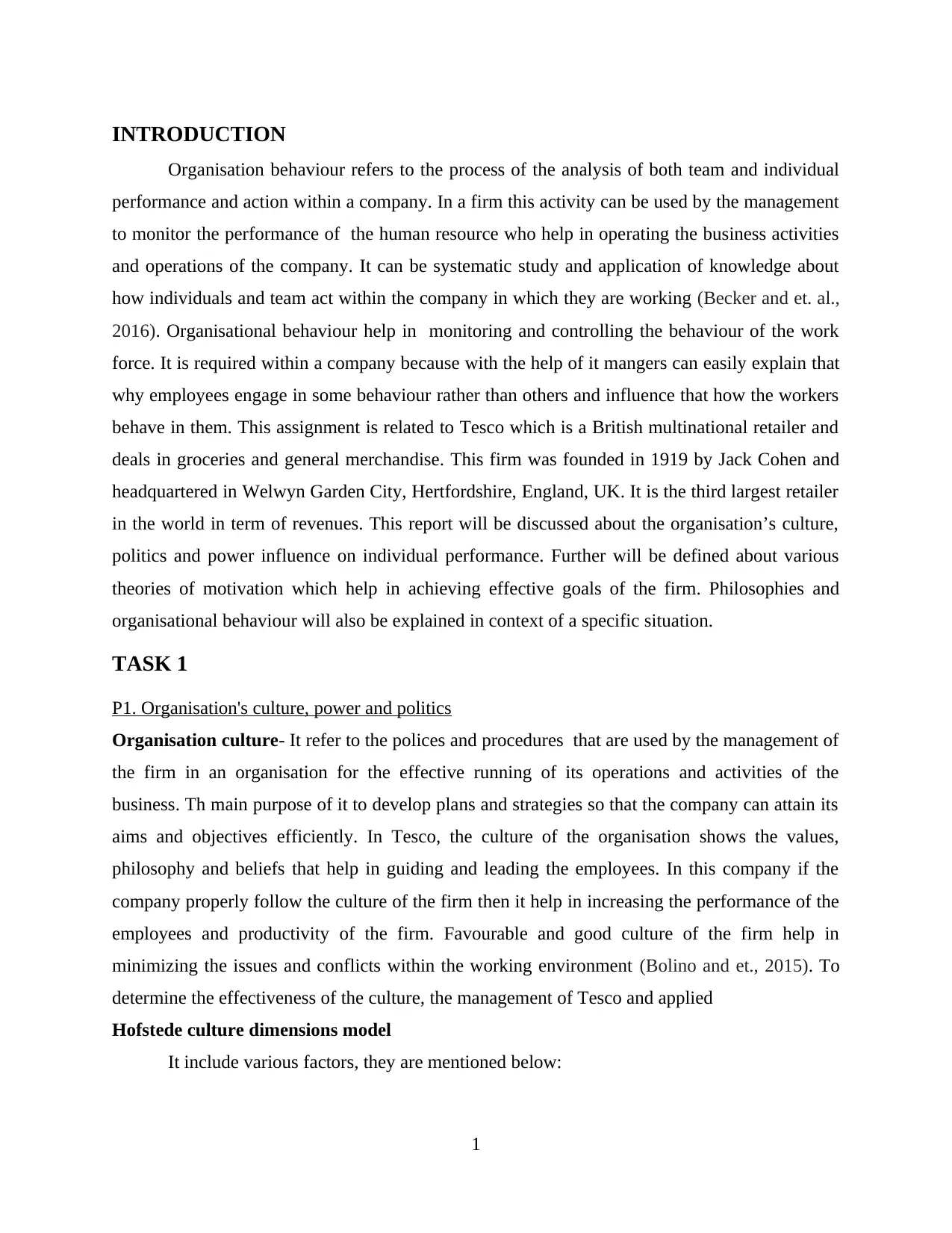
INTRODUCTION
Organisation behaviour refers to the process of the analysis of both team and individual
performance and action within a company. In a firm this activity can be used by the management
to monitor the performance of the human resource who help in operating the business activities
and operations of the company. It can be systematic study and application of knowledge about
how individuals and team act within the company in which they are working (Becker and et. al.,
2016). Organisational behaviour help in monitoring and controlling the behaviour of the work
force. It is required within a company because with the help of it mangers can easily explain that
why employees engage in some behaviour rather than others and influence that how the workers
behave in them. This assignment is related to Tesco which is a British multinational retailer and
deals in groceries and general merchandise. This firm was founded in 1919 by Jack Cohen and
headquartered in Welwyn Garden City, Hertfordshire, England, UK. It is the third largest retailer
in the world in term of revenues. This report will be discussed about the organisation’s culture,
politics and power influence on individual performance. Further will be defined about various
theories of motivation which help in achieving effective goals of the firm. Philosophies and
organisational behaviour will also be explained in context of a specific situation.
TASK 1
P1. Organisation's culture, power and politics
Organisation culture- It refer to the polices and procedures that are used by the management of
the firm in an organisation for the effective running of its operations and activities of the
business. Th main purpose of it to develop plans and strategies so that the company can attain its
aims and objectives efficiently. In Tesco, the culture of the organisation shows the values,
philosophy and beliefs that help in guiding and leading the employees. In this company if the
company properly follow the culture of the firm then it help in increasing the performance of the
employees and productivity of the firm. Favourable and good culture of the firm help in
minimizing the issues and conflicts within the working environment (Bolino and et., 2015). To
determine the effectiveness of the culture, the management of Tesco and applied
Hofstede culture dimensions model
It include various factors, they are mentioned below:
1
Organisation behaviour refers to the process of the analysis of both team and individual
performance and action within a company. In a firm this activity can be used by the management
to monitor the performance of the human resource who help in operating the business activities
and operations of the company. It can be systematic study and application of knowledge about
how individuals and team act within the company in which they are working (Becker and et. al.,
2016). Organisational behaviour help in monitoring and controlling the behaviour of the work
force. It is required within a company because with the help of it mangers can easily explain that
why employees engage in some behaviour rather than others and influence that how the workers
behave in them. This assignment is related to Tesco which is a British multinational retailer and
deals in groceries and general merchandise. This firm was founded in 1919 by Jack Cohen and
headquartered in Welwyn Garden City, Hertfordshire, England, UK. It is the third largest retailer
in the world in term of revenues. This report will be discussed about the organisation’s culture,
politics and power influence on individual performance. Further will be defined about various
theories of motivation which help in achieving effective goals of the firm. Philosophies and
organisational behaviour will also be explained in context of a specific situation.
TASK 1
P1. Organisation's culture, power and politics
Organisation culture- It refer to the polices and procedures that are used by the management of
the firm in an organisation for the effective running of its operations and activities of the
business. Th main purpose of it to develop plans and strategies so that the company can attain its
aims and objectives efficiently. In Tesco, the culture of the organisation shows the values,
philosophy and beliefs that help in guiding and leading the employees. In this company if the
company properly follow the culture of the firm then it help in increasing the performance of the
employees and productivity of the firm. Favourable and good culture of the firm help in
minimizing the issues and conflicts within the working environment (Bolino and et., 2015). To
determine the effectiveness of the culture, the management of Tesco and applied
Hofstede culture dimensions model
It include various factors, they are mentioned below:
1
⊘ This is a preview!⊘
Do you want full access?
Subscribe today to unlock all pages.

Trusted by 1+ million students worldwide
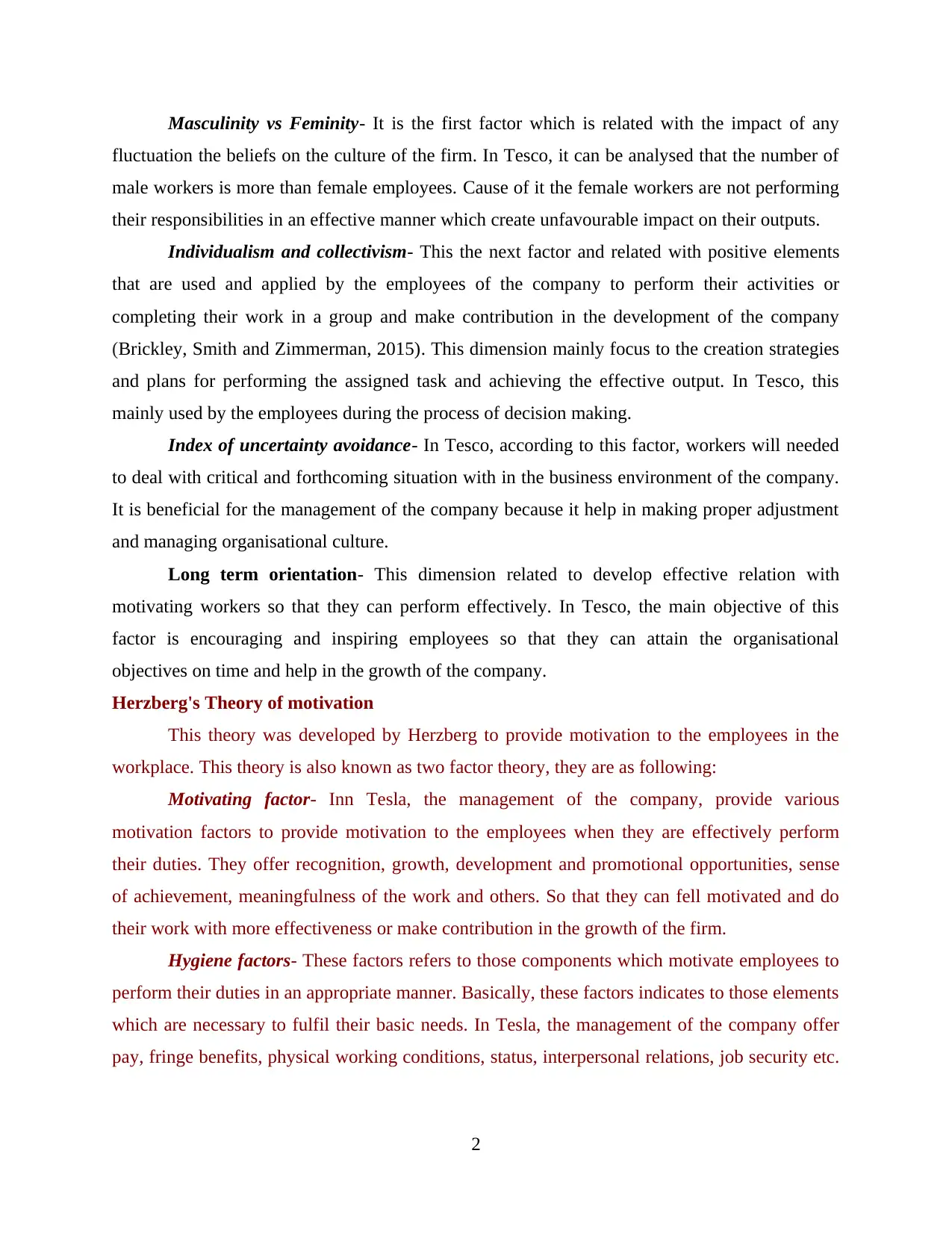
Masculinity vs Feminity- It is the first factor which is related with the impact of any
fluctuation the beliefs on the culture of the firm. In Tesco, it can be analysed that the number of
male workers is more than female employees. Cause of it the female workers are not performing
their responsibilities in an effective manner which create unfavourable impact on their outputs.
Individualism and collectivism- This the next factor and related with positive elements
that are used and applied by the employees of the company to perform their activities or
completing their work in a group and make contribution in the development of the company
(Brickley, Smith and Zimmerman, 2015). This dimension mainly focus to the creation strategies
and plans for performing the assigned task and achieving the effective output. In Tesco, this
mainly used by the employees during the process of decision making.
Index of uncertainty avoidance- In Tesco, according to this factor, workers will needed
to deal with critical and forthcoming situation with in the business environment of the company.
It is beneficial for the management of the company because it help in making proper adjustment
and managing organisational culture.
Long term orientation- This dimension related to develop effective relation with
motivating workers so that they can perform effectively. In Tesco, the main objective of this
factor is encouraging and inspiring employees so that they can attain the organisational
objectives on time and help in the growth of the company.
Herzberg's Theory of motivation
This theory was developed by Herzberg to provide motivation to the employees in the
workplace. This theory is also known as two factor theory, they are as following:
Motivating factor- Inn Tesla, the management of the company, provide various
motivation factors to provide motivation to the employees when they are effectively perform
their duties. They offer recognition, growth, development and promotional opportunities, sense
of achievement, meaningfulness of the work and others. So that they can fell motivated and do
their work with more effectiveness or make contribution in the growth of the firm.
Hygiene factors- These factors refers to those components which motivate employees to
perform their duties in an appropriate manner. Basically, these factors indicates to those elements
which are necessary to fulfil their basic needs. In Tesla, the management of the company offer
pay, fringe benefits, physical working conditions, status, interpersonal relations, job security etc.
2
fluctuation the beliefs on the culture of the firm. In Tesco, it can be analysed that the number of
male workers is more than female employees. Cause of it the female workers are not performing
their responsibilities in an effective manner which create unfavourable impact on their outputs.
Individualism and collectivism- This the next factor and related with positive elements
that are used and applied by the employees of the company to perform their activities or
completing their work in a group and make contribution in the development of the company
(Brickley, Smith and Zimmerman, 2015). This dimension mainly focus to the creation strategies
and plans for performing the assigned task and achieving the effective output. In Tesco, this
mainly used by the employees during the process of decision making.
Index of uncertainty avoidance- In Tesco, according to this factor, workers will needed
to deal with critical and forthcoming situation with in the business environment of the company.
It is beneficial for the management of the company because it help in making proper adjustment
and managing organisational culture.
Long term orientation- This dimension related to develop effective relation with
motivating workers so that they can perform effectively. In Tesco, the main objective of this
factor is encouraging and inspiring employees so that they can attain the organisational
objectives on time and help in the growth of the company.
Herzberg's Theory of motivation
This theory was developed by Herzberg to provide motivation to the employees in the
workplace. This theory is also known as two factor theory, they are as following:
Motivating factor- Inn Tesla, the management of the company, provide various
motivation factors to provide motivation to the employees when they are effectively perform
their duties. They offer recognition, growth, development and promotional opportunities, sense
of achievement, meaningfulness of the work and others. So that they can fell motivated and do
their work with more effectiveness or make contribution in the growth of the firm.
Hygiene factors- These factors refers to those components which motivate employees to
perform their duties in an appropriate manner. Basically, these factors indicates to those elements
which are necessary to fulfil their basic needs. In Tesla, the management of the company offer
pay, fringe benefits, physical working conditions, status, interpersonal relations, job security etc.
2
Paraphrase This Document
Need a fresh take? Get an instant paraphrase of this document with our AI Paraphraser
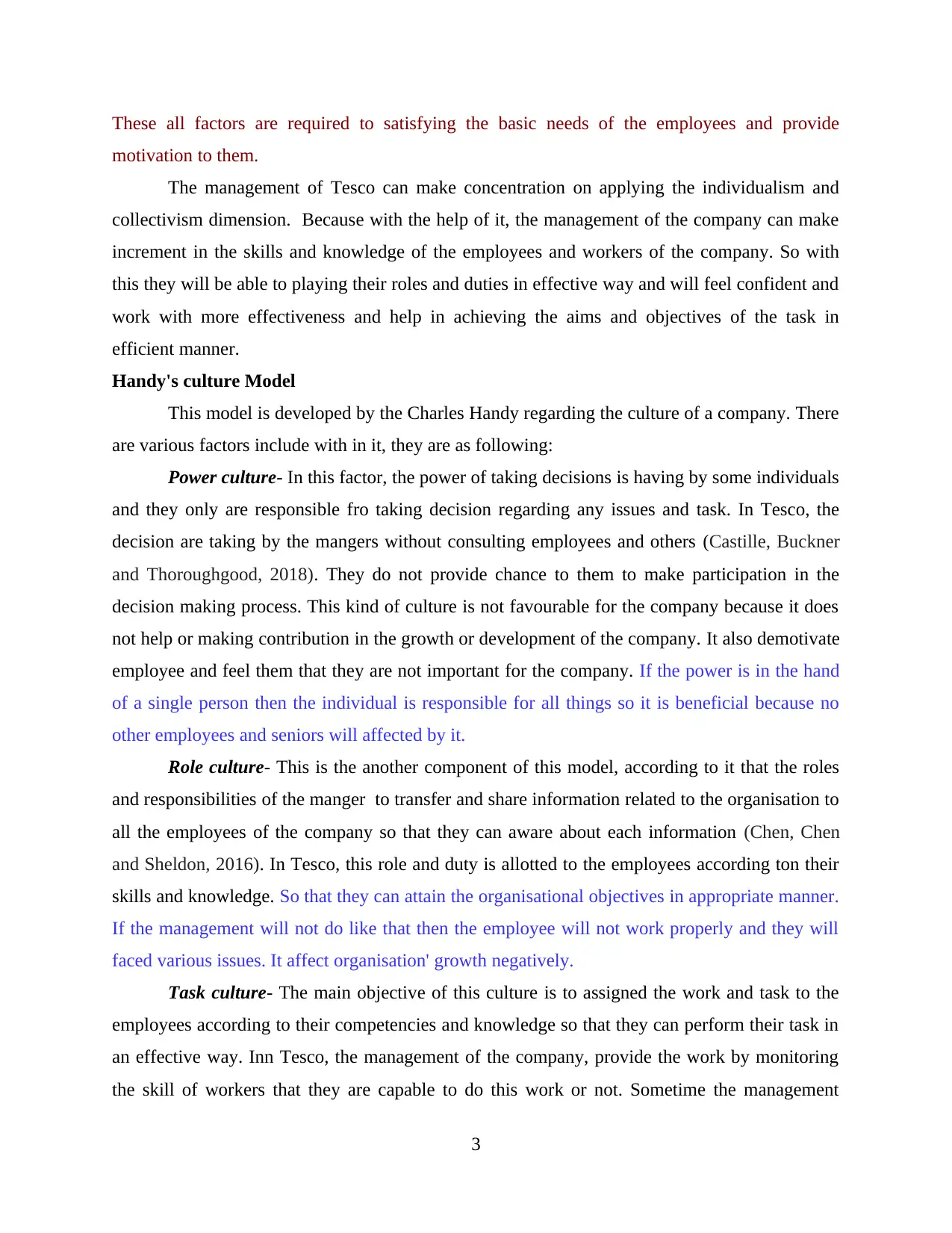
These all factors are required to satisfying the basic needs of the employees and provide
motivation to them.
The management of Tesco can make concentration on applying the individualism and
collectivism dimension. Because with the help of it, the management of the company can make
increment in the skills and knowledge of the employees and workers of the company. So with
this they will be able to playing their roles and duties in effective way and will feel confident and
work with more effectiveness and help in achieving the aims and objectives of the task in
efficient manner.
Handy's culture Model
This model is developed by the Charles Handy regarding the culture of a company. There
are various factors include with in it, they are as following:
Power culture- In this factor, the power of taking decisions is having by some individuals
and they only are responsible fro taking decision regarding any issues and task. In Tesco, the
decision are taking by the mangers without consulting employees and others (Castille, Buckner
and Thoroughgood, 2018). They do not provide chance to them to make participation in the
decision making process. This kind of culture is not favourable for the company because it does
not help or making contribution in the growth or development of the company. It also demotivate
employee and feel them that they are not important for the company. If the power is in the hand
of a single person then the individual is responsible for all things so it is beneficial because no
other employees and seniors will affected by it.
Role culture- This is the another component of this model, according to it that the roles
and responsibilities of the manger to transfer and share information related to the organisation to
all the employees of the company so that they can aware about each information (Chen, Chen
and Sheldon, 2016). In Tesco, this role and duty is allotted to the employees according ton their
skills and knowledge. So that they can attain the organisational objectives in appropriate manner.
If the management will not do like that then the employee will not work properly and they will
faced various issues. It affect organisation' growth negatively.
Task culture- The main objective of this culture is to assigned the work and task to the
employees according to their competencies and knowledge so that they can perform their task in
an effective way. Inn Tesco, the management of the company, provide the work by monitoring
the skill of workers that they are capable to do this work or not. Sometime the management
3
motivation to them.
The management of Tesco can make concentration on applying the individualism and
collectivism dimension. Because with the help of it, the management of the company can make
increment in the skills and knowledge of the employees and workers of the company. So with
this they will be able to playing their roles and duties in effective way and will feel confident and
work with more effectiveness and help in achieving the aims and objectives of the task in
efficient manner.
Handy's culture Model
This model is developed by the Charles Handy regarding the culture of a company. There
are various factors include with in it, they are as following:
Power culture- In this factor, the power of taking decisions is having by some individuals
and they only are responsible fro taking decision regarding any issues and task. In Tesco, the
decision are taking by the mangers without consulting employees and others (Castille, Buckner
and Thoroughgood, 2018). They do not provide chance to them to make participation in the
decision making process. This kind of culture is not favourable for the company because it does
not help or making contribution in the growth or development of the company. It also demotivate
employee and feel them that they are not important for the company. If the power is in the hand
of a single person then the individual is responsible for all things so it is beneficial because no
other employees and seniors will affected by it.
Role culture- This is the another component of this model, according to it that the roles
and responsibilities of the manger to transfer and share information related to the organisation to
all the employees of the company so that they can aware about each information (Chen, Chen
and Sheldon, 2016). In Tesco, this role and duty is allotted to the employees according ton their
skills and knowledge. So that they can attain the organisational objectives in appropriate manner.
If the management will not do like that then the employee will not work properly and they will
faced various issues. It affect organisation' growth negatively.
Task culture- The main objective of this culture is to assigned the work and task to the
employees according to their competencies and knowledge so that they can perform their task in
an effective way. Inn Tesco, the management of the company, provide the work by monitoring
the skill of workers that they are capable to do this work or not. Sometime the management
3
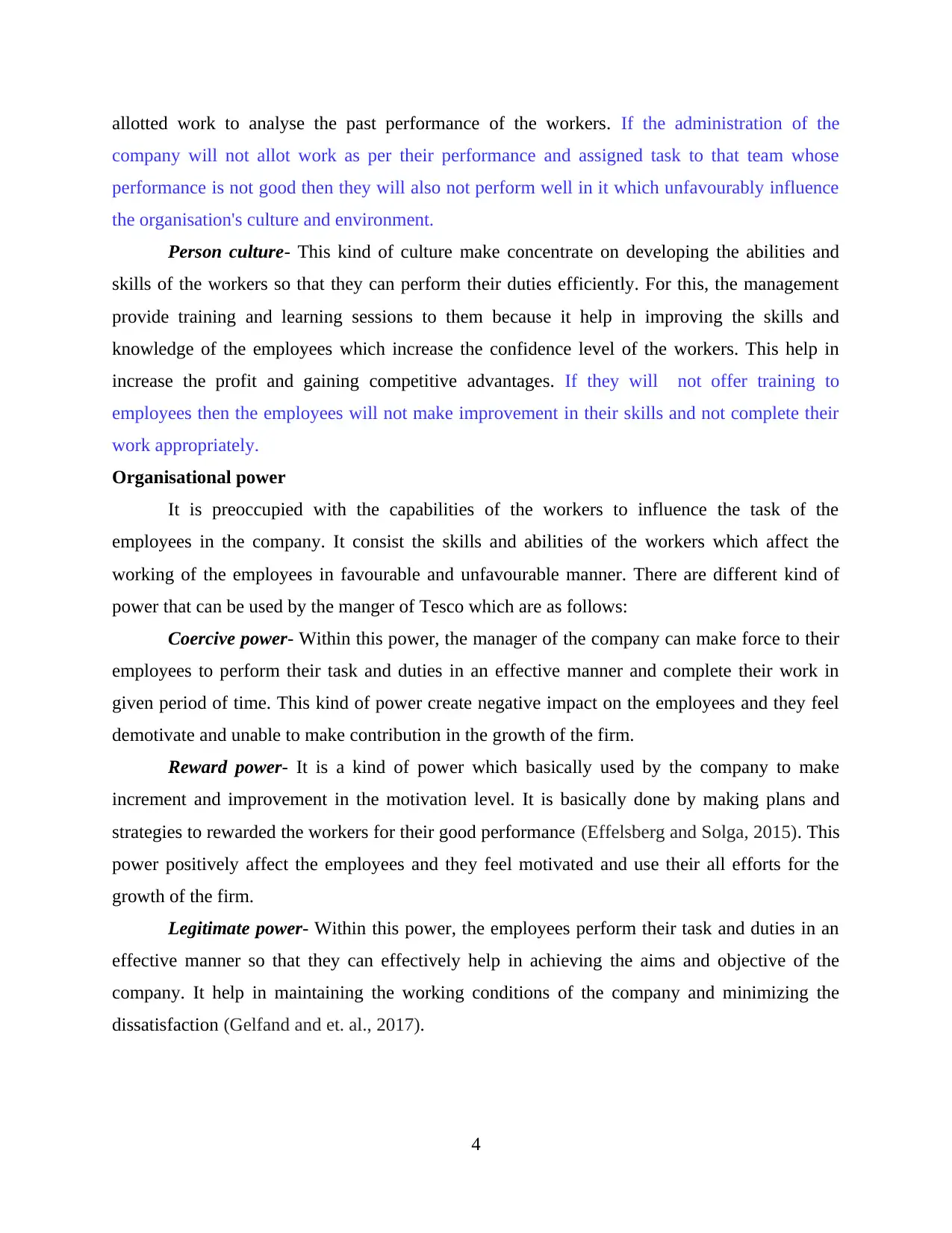
allotted work to analyse the past performance of the workers. If the administration of the
company will not allot work as per their performance and assigned task to that team whose
performance is not good then they will also not perform well in it which unfavourably influence
the organisation's culture and environment.
Person culture- This kind of culture make concentrate on developing the abilities and
skills of the workers so that they can perform their duties efficiently. For this, the management
provide training and learning sessions to them because it help in improving the skills and
knowledge of the employees which increase the confidence level of the workers. This help in
increase the profit and gaining competitive advantages. If they will not offer training to
employees then the employees will not make improvement in their skills and not complete their
work appropriately.
Organisational power
It is preoccupied with the capabilities of the workers to influence the task of the
employees in the company. It consist the skills and abilities of the workers which affect the
working of the employees in favourable and unfavourable manner. There are different kind of
power that can be used by the manger of Tesco which are as follows:
Coercive power- Within this power, the manager of the company can make force to their
employees to perform their task and duties in an effective manner and complete their work in
given period of time. This kind of power create negative impact on the employees and they feel
demotivate and unable to make contribution in the growth of the firm.
Reward power- It is a kind of power which basically used by the company to make
increment and improvement in the motivation level. It is basically done by making plans and
strategies to rewarded the workers for their good performance (Effelsberg and Solga, 2015). This
power positively affect the employees and they feel motivated and use their all efforts for the
growth of the firm.
Legitimate power- Within this power, the employees perform their task and duties in an
effective manner so that they can effectively help in achieving the aims and objective of the
company. It help in maintaining the working conditions of the company and minimizing the
dissatisfaction (Gelfand and et. al., 2017).
4
company will not allot work as per their performance and assigned task to that team whose
performance is not good then they will also not perform well in it which unfavourably influence
the organisation's culture and environment.
Person culture- This kind of culture make concentrate on developing the abilities and
skills of the workers so that they can perform their duties efficiently. For this, the management
provide training and learning sessions to them because it help in improving the skills and
knowledge of the employees which increase the confidence level of the workers. This help in
increase the profit and gaining competitive advantages. If they will not offer training to
employees then the employees will not make improvement in their skills and not complete their
work appropriately.
Organisational power
It is preoccupied with the capabilities of the workers to influence the task of the
employees in the company. It consist the skills and abilities of the workers which affect the
working of the employees in favourable and unfavourable manner. There are different kind of
power that can be used by the manger of Tesco which are as follows:
Coercive power- Within this power, the manager of the company can make force to their
employees to perform their task and duties in an effective manner and complete their work in
given period of time. This kind of power create negative impact on the employees and they feel
demotivate and unable to make contribution in the growth of the firm.
Reward power- It is a kind of power which basically used by the company to make
increment and improvement in the motivation level. It is basically done by making plans and
strategies to rewarded the workers for their good performance (Effelsberg and Solga, 2015). This
power positively affect the employees and they feel motivated and use their all efforts for the
growth of the firm.
Legitimate power- Within this power, the employees perform their task and duties in an
effective manner so that they can effectively help in achieving the aims and objective of the
company. It help in maintaining the working conditions of the company and minimizing the
dissatisfaction (Gelfand and et. al., 2017).
4
⊘ This is a preview!⊘
Do you want full access?
Subscribe today to unlock all pages.

Trusted by 1+ million students worldwide
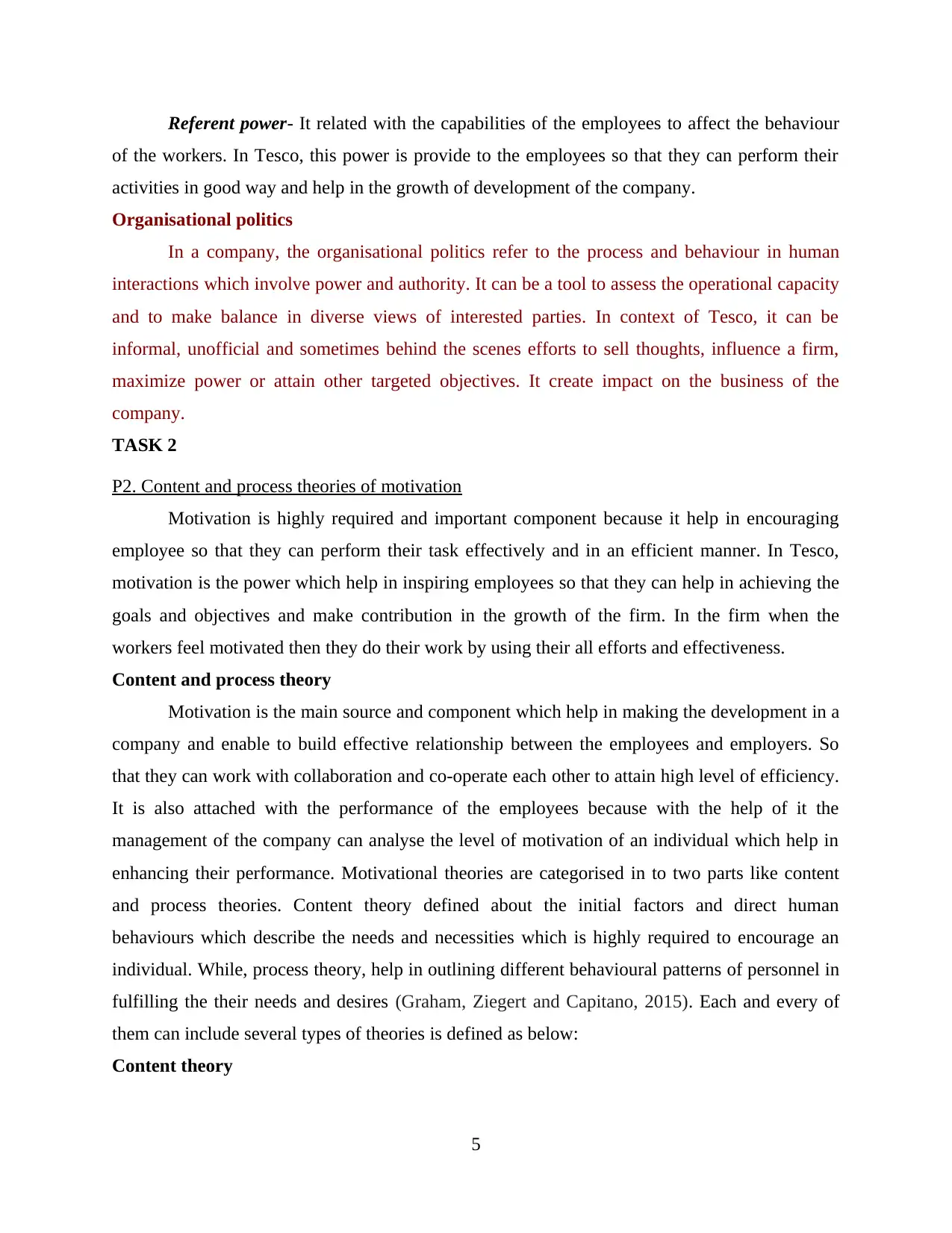
Referent power- It related with the capabilities of the employees to affect the behaviour
of the workers. In Tesco, this power is provide to the employees so that they can perform their
activities in good way and help in the growth of development of the company.
Organisational politics
In a company, the organisational politics refer to the process and behaviour in human
interactions which involve power and authority. It can be a tool to assess the operational capacity
and to make balance in diverse views of interested parties. In context of Tesco, it can be
informal, unofficial and sometimes behind the scenes efforts to sell thoughts, influence a firm,
maximize power or attain other targeted objectives. It create impact on the business of the
company.
TASK 2
P2. Content and process theories of motivation
Motivation is highly required and important component because it help in encouraging
employee so that they can perform their task effectively and in an efficient manner. In Tesco,
motivation is the power which help in inspiring employees so that they can help in achieving the
goals and objectives and make contribution in the growth of the firm. In the firm when the
workers feel motivated then they do their work by using their all efforts and effectiveness.
Content and process theory
Motivation is the main source and component which help in making the development in a
company and enable to build effective relationship between the employees and employers. So
that they can work with collaboration and co-operate each other to attain high level of efficiency.
It is also attached with the performance of the employees because with the help of it the
management of the company can analyse the level of motivation of an individual which help in
enhancing their performance. Motivational theories are categorised in to two parts like content
and process theories. Content theory defined about the initial factors and direct human
behaviours which describe the needs and necessities which is highly required to encourage an
individual. While, process theory, help in outlining different behavioural patterns of personnel in
fulfilling the their needs and desires (Graham, Ziegert and Capitano, 2015). Each and every of
them can include several types of theories is defined as below:
Content theory
5
of the workers. In Tesco, this power is provide to the employees so that they can perform their
activities in good way and help in the growth of development of the company.
Organisational politics
In a company, the organisational politics refer to the process and behaviour in human
interactions which involve power and authority. It can be a tool to assess the operational capacity
and to make balance in diverse views of interested parties. In context of Tesco, it can be
informal, unofficial and sometimes behind the scenes efforts to sell thoughts, influence a firm,
maximize power or attain other targeted objectives. It create impact on the business of the
company.
TASK 2
P2. Content and process theories of motivation
Motivation is highly required and important component because it help in encouraging
employee so that they can perform their task effectively and in an efficient manner. In Tesco,
motivation is the power which help in inspiring employees so that they can help in achieving the
goals and objectives and make contribution in the growth of the firm. In the firm when the
workers feel motivated then they do their work by using their all efforts and effectiveness.
Content and process theory
Motivation is the main source and component which help in making the development in a
company and enable to build effective relationship between the employees and employers. So
that they can work with collaboration and co-operate each other to attain high level of efficiency.
It is also attached with the performance of the employees because with the help of it the
management of the company can analyse the level of motivation of an individual which help in
enhancing their performance. Motivational theories are categorised in to two parts like content
and process theories. Content theory defined about the initial factors and direct human
behaviours which describe the needs and necessities which is highly required to encourage an
individual. While, process theory, help in outlining different behavioural patterns of personnel in
fulfilling the their needs and desires (Graham, Ziegert and Capitano, 2015). Each and every of
them can include several types of theories is defined as below:
Content theory
5
Paraphrase This Document
Need a fresh take? Get an instant paraphrase of this document with our AI Paraphraser
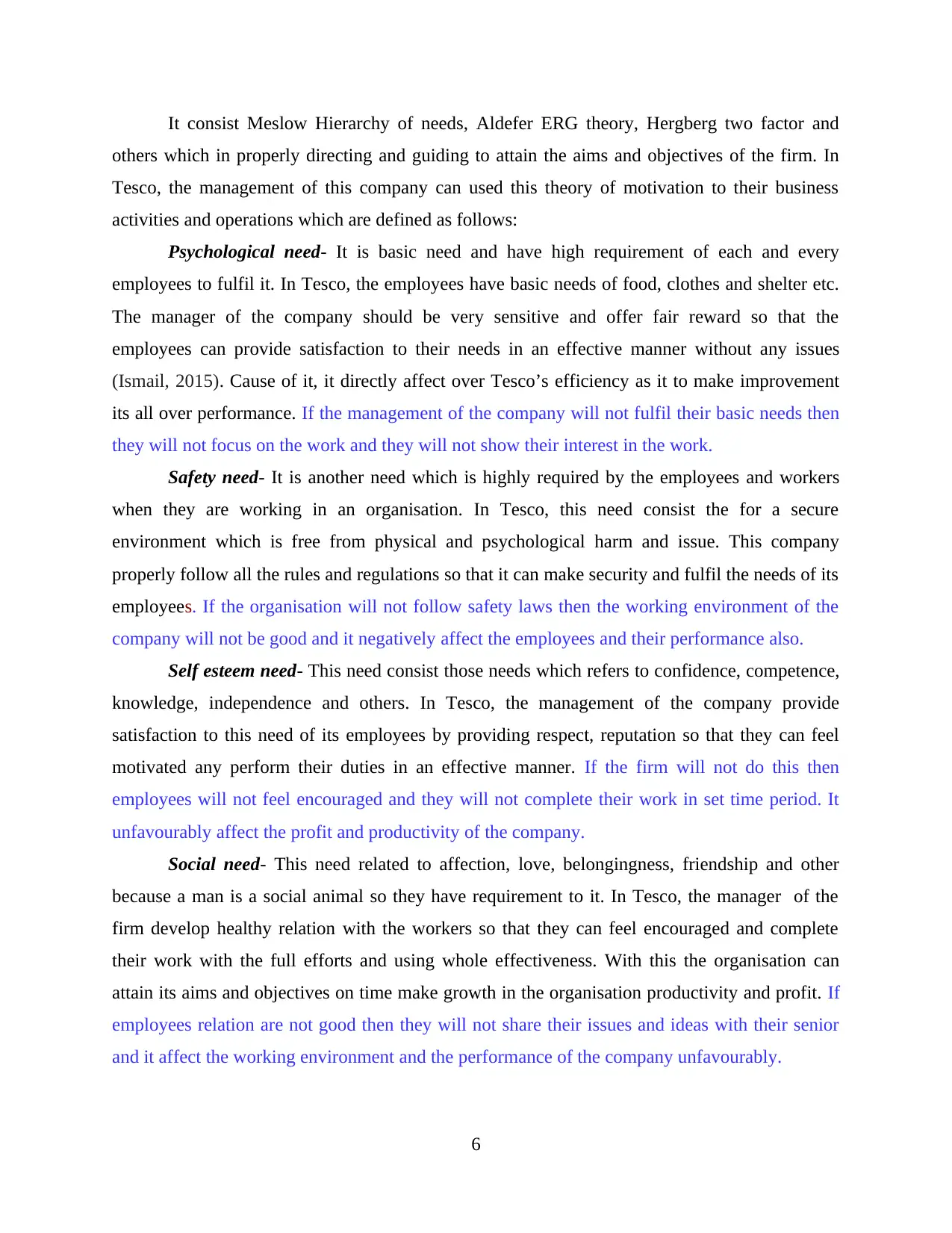
It consist Meslow Hierarchy of needs, Aldefer ERG theory, Hergberg two factor and
others which in properly directing and guiding to attain the aims and objectives of the firm. In
Tesco, the management of this company can used this theory of motivation to their business
activities and operations which are defined as follows:
Psychological need- It is basic need and have high requirement of each and every
employees to fulfil it. In Tesco, the employees have basic needs of food, clothes and shelter etc.
The manager of the company should be very sensitive and offer fair reward so that the
employees can provide satisfaction to their needs in an effective manner without any issues
(Ismail, 2015). Cause of it, it directly affect over Tesco’s efficiency as it to make improvement
its all over performance. If the management of the company will not fulfil their basic needs then
they will not focus on the work and they will not show their interest in the work.
Safety need- It is another need which is highly required by the employees and workers
when they are working in an organisation. In Tesco, this need consist the for a secure
environment which is free from physical and psychological harm and issue. This company
properly follow all the rules and regulations so that it can make security and fulfil the needs of its
employees. If the organisation will not follow safety laws then the working environment of the
company will not be good and it negatively affect the employees and their performance also.
Self esteem need- This need consist those needs which refers to confidence, competence,
knowledge, independence and others. In Tesco, the management of the company provide
satisfaction to this need of its employees by providing respect, reputation so that they can feel
motivated any perform their duties in an effective manner. If the firm will not do this then
employees will not feel encouraged and they will not complete their work in set time period. It
unfavourably affect the profit and productivity of the company.
Social need- This need related to affection, love, belongingness, friendship and other
because a man is a social animal so they have requirement to it. In Tesco, the manager of the
firm develop healthy relation with the workers so that they can feel encouraged and complete
their work with the full efforts and using whole effectiveness. With this the organisation can
attain its aims and objectives on time make growth in the organisation productivity and profit. If
employees relation are not good then they will not share their issues and ideas with their senior
and it affect the working environment and the performance of the company unfavourably.
6
others which in properly directing and guiding to attain the aims and objectives of the firm. In
Tesco, the management of this company can used this theory of motivation to their business
activities and operations which are defined as follows:
Psychological need- It is basic need and have high requirement of each and every
employees to fulfil it. In Tesco, the employees have basic needs of food, clothes and shelter etc.
The manager of the company should be very sensitive and offer fair reward so that the
employees can provide satisfaction to their needs in an effective manner without any issues
(Ismail, 2015). Cause of it, it directly affect over Tesco’s efficiency as it to make improvement
its all over performance. If the management of the company will not fulfil their basic needs then
they will not focus on the work and they will not show their interest in the work.
Safety need- It is another need which is highly required by the employees and workers
when they are working in an organisation. In Tesco, this need consist the for a secure
environment which is free from physical and psychological harm and issue. This company
properly follow all the rules and regulations so that it can make security and fulfil the needs of its
employees. If the organisation will not follow safety laws then the working environment of the
company will not be good and it negatively affect the employees and their performance also.
Self esteem need- This need consist those needs which refers to confidence, competence,
knowledge, independence and others. In Tesco, the management of the company provide
satisfaction to this need of its employees by providing respect, reputation so that they can feel
motivated any perform their duties in an effective manner. If the firm will not do this then
employees will not feel encouraged and they will not complete their work in set time period. It
unfavourably affect the profit and productivity of the company.
Social need- This need related to affection, love, belongingness, friendship and other
because a man is a social animal so they have requirement to it. In Tesco, the manager of the
firm develop healthy relation with the workers so that they can feel encouraged and complete
their work with the full efforts and using whole effectiveness. With this the organisation can
attain its aims and objectives on time make growth in the organisation productivity and profit. If
employees relation are not good then they will not share their issues and ideas with their senior
and it affect the working environment and the performance of the company unfavourably.
6
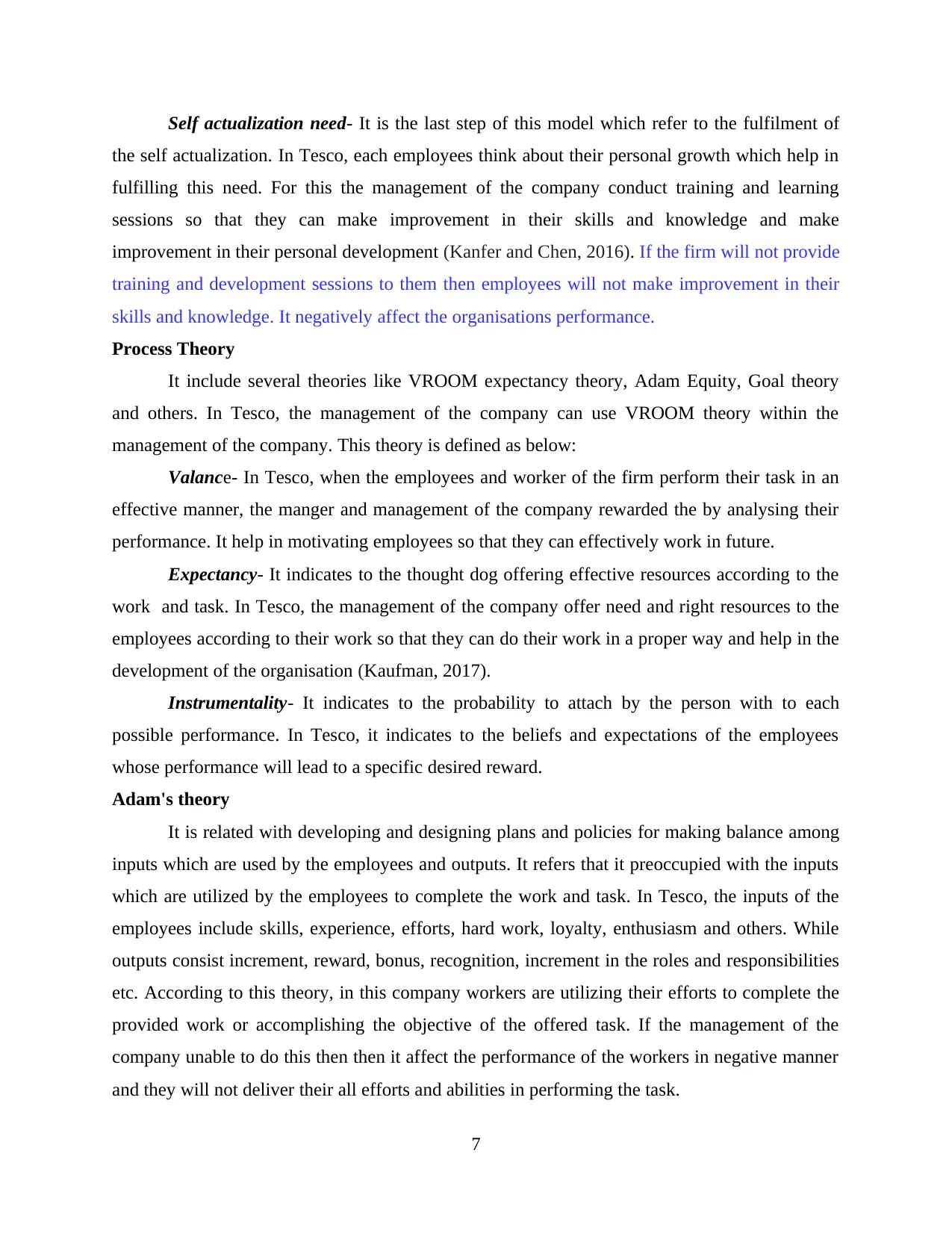
Self actualization need- It is the last step of this model which refer to the fulfilment of
the self actualization. In Tesco, each employees think about their personal growth which help in
fulfilling this need. For this the management of the company conduct training and learning
sessions so that they can make improvement in their skills and knowledge and make
improvement in their personal development (Kanfer and Chen, 2016). If the firm will not provide
training and development sessions to them then employees will not make improvement in their
skills and knowledge. It negatively affect the organisations performance.
Process Theory
It include several theories like VROOM expectancy theory, Adam Equity, Goal theory
and others. In Tesco, the management of the company can use VROOM theory within the
management of the company. This theory is defined as below:
Valance- In Tesco, when the employees and worker of the firm perform their task in an
effective manner, the manger and management of the company rewarded the by analysing their
performance. It help in motivating employees so that they can effectively work in future.
Expectancy- It indicates to the thought dog offering effective resources according to the
work and task. In Tesco, the management of the company offer need and right resources to the
employees according to their work so that they can do their work in a proper way and help in the
development of the organisation (Kaufman, 2017).
Instrumentality- It indicates to the probability to attach by the person with to each
possible performance. In Tesco, it indicates to the beliefs and expectations of the employees
whose performance will lead to a specific desired reward.
Adam's theory
It is related with developing and designing plans and policies for making balance among
inputs which are used by the employees and outputs. It refers that it preoccupied with the inputs
which are utilized by the employees to complete the work and task. In Tesco, the inputs of the
employees include skills, experience, efforts, hard work, loyalty, enthusiasm and others. While
outputs consist increment, reward, bonus, recognition, increment in the roles and responsibilities
etc. According to this theory, in this company workers are utilizing their efforts to complete the
provided work or accomplishing the objective of the offered task. If the management of the
company unable to do this then then it affect the performance of the workers in negative manner
and they will not deliver their all efforts and abilities in performing the task.
7
the self actualization. In Tesco, each employees think about their personal growth which help in
fulfilling this need. For this the management of the company conduct training and learning
sessions so that they can make improvement in their skills and knowledge and make
improvement in their personal development (Kanfer and Chen, 2016). If the firm will not provide
training and development sessions to them then employees will not make improvement in their
skills and knowledge. It negatively affect the organisations performance.
Process Theory
It include several theories like VROOM expectancy theory, Adam Equity, Goal theory
and others. In Tesco, the management of the company can use VROOM theory within the
management of the company. This theory is defined as below:
Valance- In Tesco, when the employees and worker of the firm perform their task in an
effective manner, the manger and management of the company rewarded the by analysing their
performance. It help in motivating employees so that they can effectively work in future.
Expectancy- It indicates to the thought dog offering effective resources according to the
work and task. In Tesco, the management of the company offer need and right resources to the
employees according to their work so that they can do their work in a proper way and help in the
development of the organisation (Kaufman, 2017).
Instrumentality- It indicates to the probability to attach by the person with to each
possible performance. In Tesco, it indicates to the beliefs and expectations of the employees
whose performance will lead to a specific desired reward.
Adam's theory
It is related with developing and designing plans and policies for making balance among
inputs which are used by the employees and outputs. It refers that it preoccupied with the inputs
which are utilized by the employees to complete the work and task. In Tesco, the inputs of the
employees include skills, experience, efforts, hard work, loyalty, enthusiasm and others. While
outputs consist increment, reward, bonus, recognition, increment in the roles and responsibilities
etc. According to this theory, in this company workers are utilizing their efforts to complete the
provided work or accomplishing the objective of the offered task. If the management of the
company unable to do this then then it affect the performance of the workers in negative manner
and they will not deliver their all efforts and abilities in performing the task.
7
⊘ This is a preview!⊘
Do you want full access?
Subscribe today to unlock all pages.

Trusted by 1+ million students worldwide
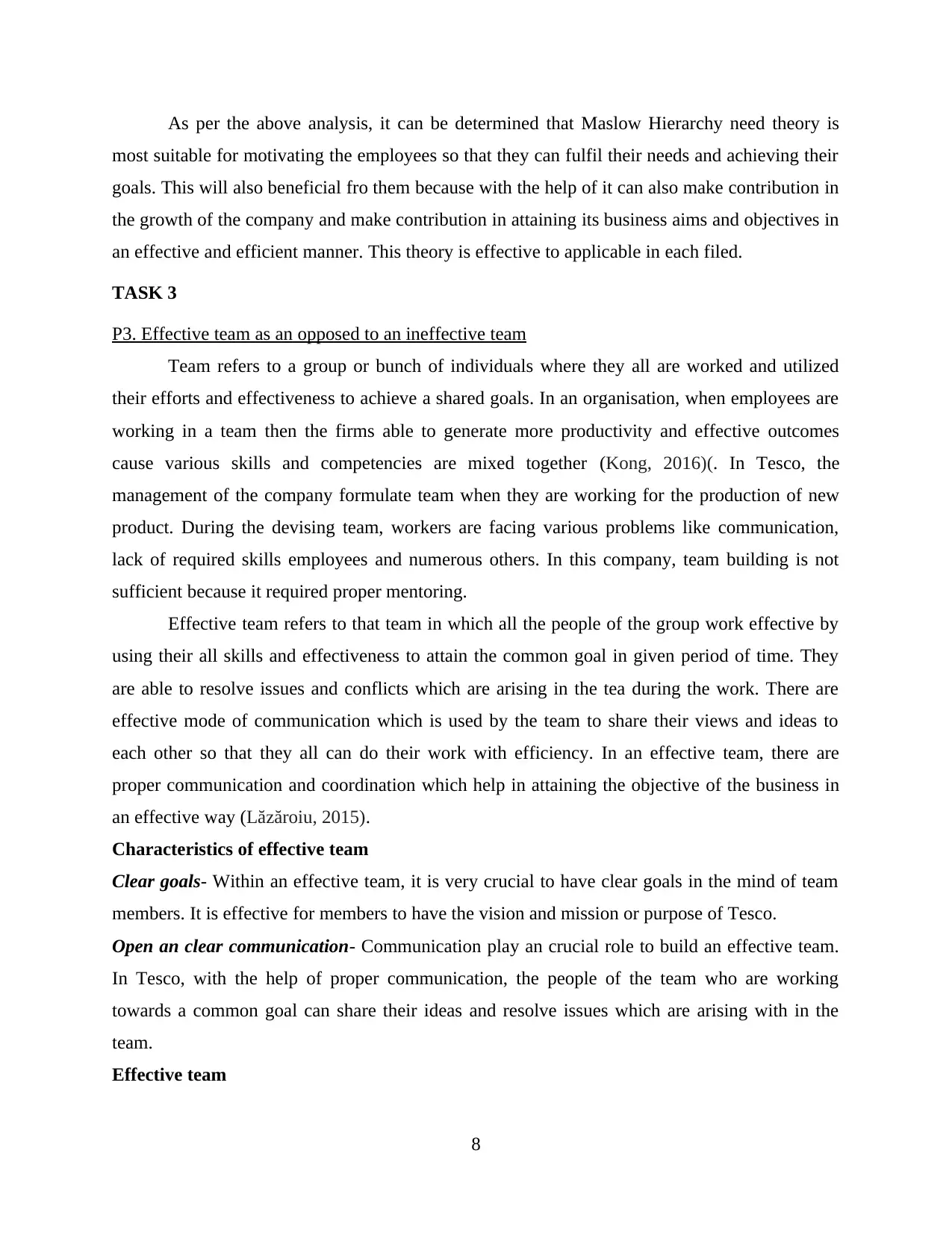
As per the above analysis, it can be determined that Maslow Hierarchy need theory is
most suitable for motivating the employees so that they can fulfil their needs and achieving their
goals. This will also beneficial fro them because with the help of it can also make contribution in
the growth of the company and make contribution in attaining its business aims and objectives in
an effective and efficient manner. This theory is effective to applicable in each filed.
TASK 3
P3. Effective team as an opposed to an ineffective team
Team refers to a group or bunch of individuals where they all are worked and utilized
their efforts and effectiveness to achieve a shared goals. In an organisation, when employees are
working in a team then the firms able to generate more productivity and effective outcomes
cause various skills and competencies are mixed together (Kong, 2016)(. In Tesco, the
management of the company formulate team when they are working for the production of new
product. During the devising team, workers are facing various problems like communication,
lack of required skills employees and numerous others. In this company, team building is not
sufficient because it required proper mentoring.
Effective team refers to that team in which all the people of the group work effective by
using their all skills and effectiveness to attain the common goal in given period of time. They
are able to resolve issues and conflicts which are arising in the tea during the work. There are
effective mode of communication which is used by the team to share their views and ideas to
each other so that they all can do their work with efficiency. In an effective team, there are
proper communication and coordination which help in attaining the objective of the business in
an effective way (Lăzăroiu, 2015).
Characteristics of effective team
Clear goals- Within an effective team, it is very crucial to have clear goals in the mind of team
members. It is effective for members to have the vision and mission or purpose of Tesco.
Open an clear communication- Communication play an crucial role to build an effective team.
In Tesco, with the help of proper communication, the people of the team who are working
towards a common goal can share their ideas and resolve issues which are arising with in the
team.
Effective team
8
most suitable for motivating the employees so that they can fulfil their needs and achieving their
goals. This will also beneficial fro them because with the help of it can also make contribution in
the growth of the company and make contribution in attaining its business aims and objectives in
an effective and efficient manner. This theory is effective to applicable in each filed.
TASK 3
P3. Effective team as an opposed to an ineffective team
Team refers to a group or bunch of individuals where they all are worked and utilized
their efforts and effectiveness to achieve a shared goals. In an organisation, when employees are
working in a team then the firms able to generate more productivity and effective outcomes
cause various skills and competencies are mixed together (Kong, 2016)(. In Tesco, the
management of the company formulate team when they are working for the production of new
product. During the devising team, workers are facing various problems like communication,
lack of required skills employees and numerous others. In this company, team building is not
sufficient because it required proper mentoring.
Effective team refers to that team in which all the people of the group work effective by
using their all skills and effectiveness to attain the common goal in given period of time. They
are able to resolve issues and conflicts which are arising in the tea during the work. There are
effective mode of communication which is used by the team to share their views and ideas to
each other so that they all can do their work with efficiency. In an effective team, there are
proper communication and coordination which help in attaining the objective of the business in
an effective way (Lăzăroiu, 2015).
Characteristics of effective team
Clear goals- Within an effective team, it is very crucial to have clear goals in the mind of team
members. It is effective for members to have the vision and mission or purpose of Tesco.
Open an clear communication- Communication play an crucial role to build an effective team.
In Tesco, with the help of proper communication, the people of the team who are working
towards a common goal can share their ideas and resolve issues which are arising with in the
team.
Effective team
8
Paraphrase This Document
Need a fresh take? Get an instant paraphrase of this document with our AI Paraphraser
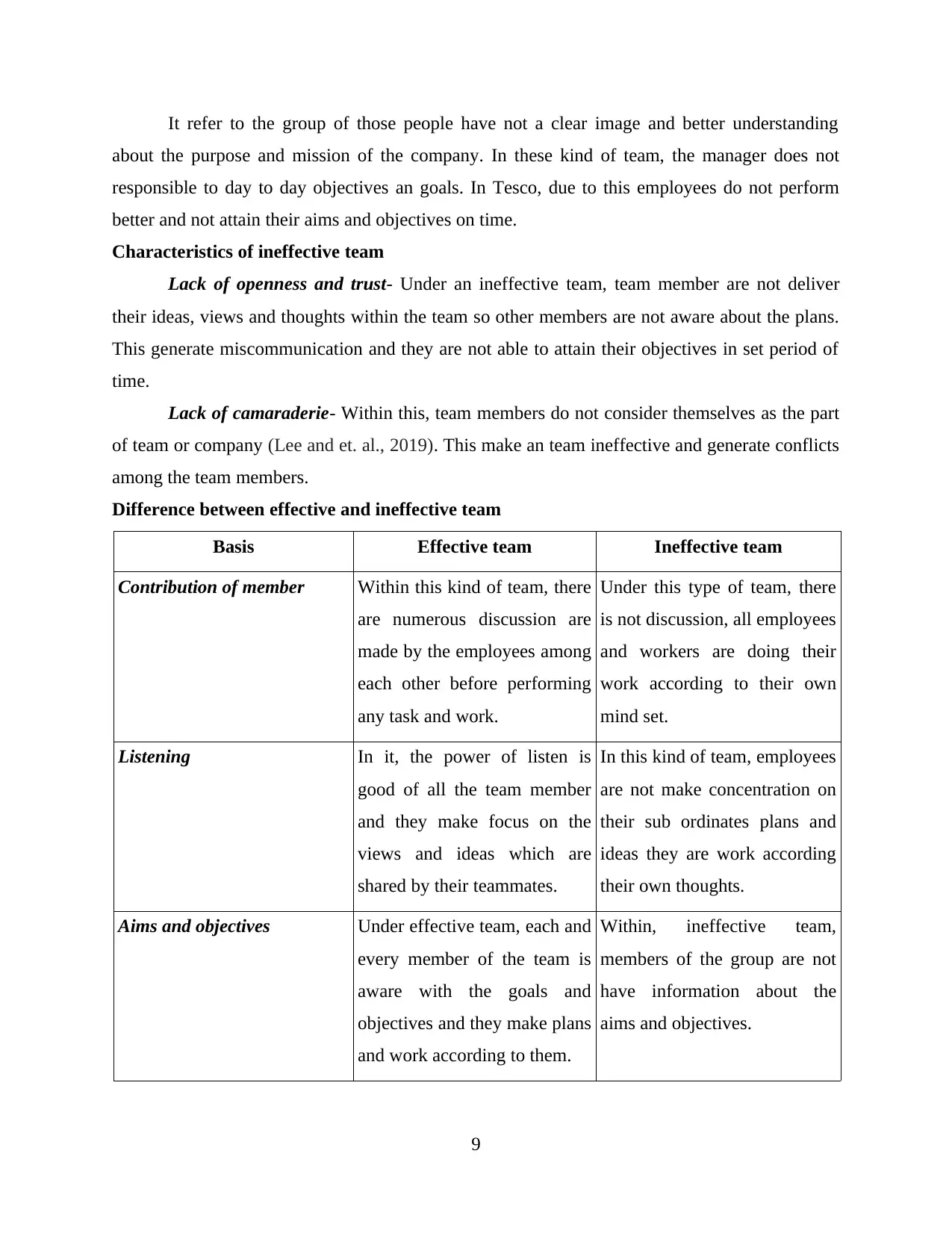
It refer to the group of those people have not a clear image and better understanding
about the purpose and mission of the company. In these kind of team, the manager does not
responsible to day to day objectives an goals. In Tesco, due to this employees do not perform
better and not attain their aims and objectives on time.
Characteristics of ineffective team
Lack of openness and trust- Under an ineffective team, team member are not deliver
their ideas, views and thoughts within the team so other members are not aware about the plans.
This generate miscommunication and they are not able to attain their objectives in set period of
time.
Lack of camaraderie- Within this, team members do not consider themselves as the part
of team or company (Lee and et. al., 2019). This make an team ineffective and generate conflicts
among the team members.
Difference between effective and ineffective team
Basis Effective team Ineffective team
Contribution of member Within this kind of team, there
are numerous discussion are
made by the employees among
each other before performing
any task and work.
Under this type of team, there
is not discussion, all employees
and workers are doing their
work according to their own
mind set.
Listening In it, the power of listen is
good of all the team member
and they make focus on the
views and ideas which are
shared by their teammates.
In this kind of team, employees
are not make concentration on
their sub ordinates plans and
ideas they are work according
their own thoughts.
Aims and objectives Under effective team, each and
every member of the team is
aware with the goals and
objectives and they make plans
and work according to them.
Within, ineffective team,
members of the group are not
have information about the
aims and objectives.
9
about the purpose and mission of the company. In these kind of team, the manager does not
responsible to day to day objectives an goals. In Tesco, due to this employees do not perform
better and not attain their aims and objectives on time.
Characteristics of ineffective team
Lack of openness and trust- Under an ineffective team, team member are not deliver
their ideas, views and thoughts within the team so other members are not aware about the plans.
This generate miscommunication and they are not able to attain their objectives in set period of
time.
Lack of camaraderie- Within this, team members do not consider themselves as the part
of team or company (Lee and et. al., 2019). This make an team ineffective and generate conflicts
among the team members.
Difference between effective and ineffective team
Basis Effective team Ineffective team
Contribution of member Within this kind of team, there
are numerous discussion are
made by the employees among
each other before performing
any task and work.
Under this type of team, there
is not discussion, all employees
and workers are doing their
work according to their own
mind set.
Listening In it, the power of listen is
good of all the team member
and they make focus on the
views and ideas which are
shared by their teammates.
In this kind of team, employees
are not make concentration on
their sub ordinates plans and
ideas they are work according
their own thoughts.
Aims and objectives Under effective team, each and
every member of the team is
aware with the goals and
objectives and they make plans
and work according to them.
Within, ineffective team,
members of the group are not
have information about the
aims and objectives.
9
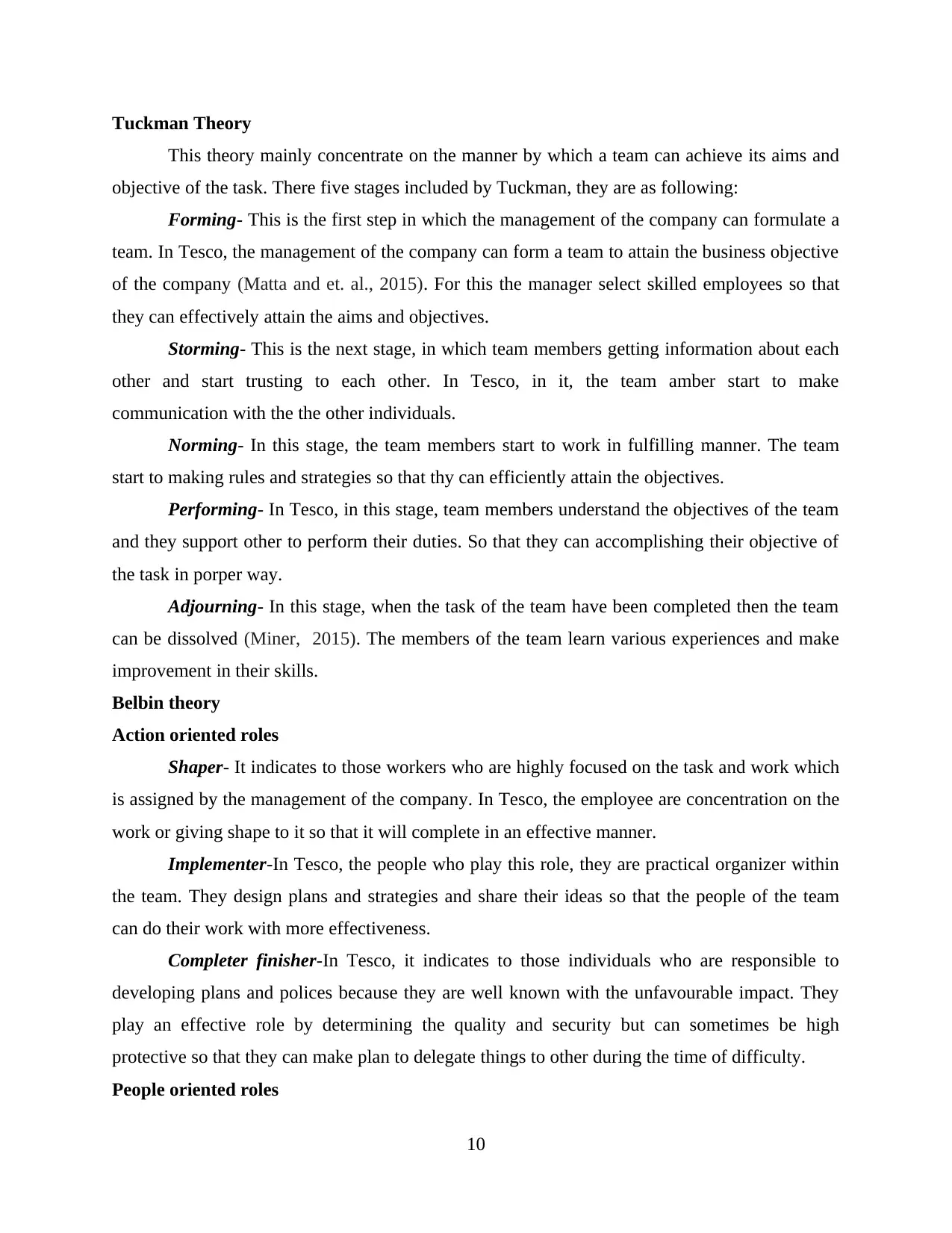
Tuckman Theory
This theory mainly concentrate on the manner by which a team can achieve its aims and
objective of the task. There five stages included by Tuckman, they are as following:
Forming- This is the first step in which the management of the company can formulate a
team. In Tesco, the management of the company can form a team to attain the business objective
of the company (Matta and et. al., 2015). For this the manager select skilled employees so that
they can effectively attain the aims and objectives.
Storming- This is the next stage, in which team members getting information about each
other and start trusting to each other. In Tesco, in it, the team amber start to make
communication with the the other individuals.
Norming- In this stage, the team members start to work in fulfilling manner. The team
start to making rules and strategies so that thy can efficiently attain the objectives.
Performing- In Tesco, in this stage, team members understand the objectives of the team
and they support other to perform their duties. So that they can accomplishing their objective of
the task in porper way.
Adjourning- In this stage, when the task of the team have been completed then the team
can be dissolved (Miner, 2015). The members of the team learn various experiences and make
improvement in their skills.
Belbin theory
Action oriented roles
Shaper- It indicates to those workers who are highly focused on the task and work which
is assigned by the management of the company. In Tesco, the employee are concentration on the
work or giving shape to it so that it will complete in an effective manner.
Implementer-In Tesco, the people who play this role, they are practical organizer within
the team. They design plans and strategies and share their ideas so that the people of the team
can do their work with more effectiveness.
Completer finisher-In Tesco, it indicates to those individuals who are responsible to
developing plans and polices because they are well known with the unfavourable impact. They
play an effective role by determining the quality and security but can sometimes be high
protective so that they can make plan to delegate things to other during the time of difficulty.
People oriented roles
10
This theory mainly concentrate on the manner by which a team can achieve its aims and
objective of the task. There five stages included by Tuckman, they are as following:
Forming- This is the first step in which the management of the company can formulate a
team. In Tesco, the management of the company can form a team to attain the business objective
of the company (Matta and et. al., 2015). For this the manager select skilled employees so that
they can effectively attain the aims and objectives.
Storming- This is the next stage, in which team members getting information about each
other and start trusting to each other. In Tesco, in it, the team amber start to make
communication with the the other individuals.
Norming- In this stage, the team members start to work in fulfilling manner. The team
start to making rules and strategies so that thy can efficiently attain the objectives.
Performing- In Tesco, in this stage, team members understand the objectives of the team
and they support other to perform their duties. So that they can accomplishing their objective of
the task in porper way.
Adjourning- In this stage, when the task of the team have been completed then the team
can be dissolved (Miner, 2015). The members of the team learn various experiences and make
improvement in their skills.
Belbin theory
Action oriented roles
Shaper- It indicates to those workers who are highly focused on the task and work which
is assigned by the management of the company. In Tesco, the employee are concentration on the
work or giving shape to it so that it will complete in an effective manner.
Implementer-In Tesco, the people who play this role, they are practical organizer within
the team. They design plans and strategies and share their ideas so that the people of the team
can do their work with more effectiveness.
Completer finisher-In Tesco, it indicates to those individuals who are responsible to
developing plans and polices because they are well known with the unfavourable impact. They
play an effective role by determining the quality and security but can sometimes be high
protective so that they can make plan to delegate things to other during the time of difficulty.
People oriented roles
10
⊘ This is a preview!⊘
Do you want full access?
Subscribe today to unlock all pages.

Trusted by 1+ million students worldwide
1 out of 18
Related Documents
Your All-in-One AI-Powered Toolkit for Academic Success.
+13062052269
info@desklib.com
Available 24*7 on WhatsApp / Email
![[object Object]](/_next/static/media/star-bottom.7253800d.svg)
Unlock your academic potential
Copyright © 2020–2026 A2Z Services. All Rights Reserved. Developed and managed by ZUCOL.




